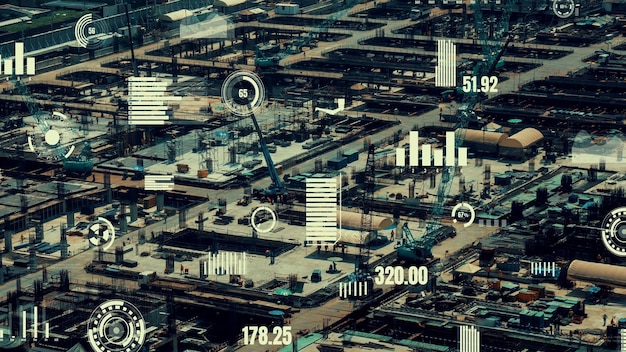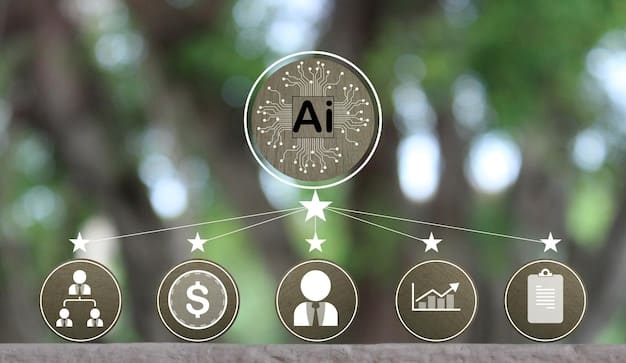US AI Research: Impact on Work & Reskilling Needs

US AI research reveals artificial intelligence’s profound impact on the future job market, necessitating comprehensive reskilling initiatives to prepare the workforce for evolving roles and technological advancements.
The rapid advancement of artificial intelligence (AI) is reshaping industries across the United States, prompting critical questions about the future of work and the skills needed to thrive in an increasingly automated environment. US AI Research: Analyzing the Impact of AI on the Future of Work and the Need for Reskilling Initiatives is essential for understanding the transformative changes and preparing the workforce for success.
Understanding AI’s Transformative Impact on US Industries
Artificial intelligence is no longer a futuristic concept; it’s a present-day reality profoundly impacting various sectors in the United States. From healthcare to finance, AI is revolutionizing how businesses operate and how jobs are structured. Understanding the extent of this transformation is the first step in preparing for the changes ahead.
AI in Healthcare
AI is making significant strides in healthcare, enhancing diagnostics, treatment planning, and patient care. Machine learning algorithms can analyze medical images with greater accuracy than human radiologists, and AI-powered robots are assisting in surgeries. However, these advancements also mean that healthcare professionals need new skills to work alongside AI systems.
AI in Finance
The financial industry is leveraging AI for fraud detection, risk management, and personalized customer service. AI algorithms can identify suspicious transactions in real-time, and chatbots are providing customers with instant support. As AI takes over routine tasks, finance professionals will need to focus on higher-level strategic and analytical roles.
- AI-driven diagnostics improving healthcare outcomes
- Fraud detection systems saving financial institutions billions
- Personalized customer service through AI chatbots

The widespread adoption of AI necessitates a thorough understanding of its impact across industries. As AI continues to evolve, it is crucial for professionals to adapt and acquire new skills to remain competitive in the job market.
The Shifting Landscape of Job Roles in the AI Era
The integration of AI into the workplace is not just changing industries; it’s also reshaping job roles. Some tasks are being automated, leading to job displacement, while new roles are emerging that require expertise in AI and related technologies. Adapting to this shifting landscape is essential for career longevity.
Job Displacement
Automation driven by AI is leading to the displacement of workers in roles that involve repetitive tasks. Manufacturing, data entry, and customer service are among the sectors most affected. It’s crucial for workers in these roles to proactively seek reskilling opportunities to transition to new careers.
Emerging AI-Related Roles
While AI is eliminating some jobs, it’s also creating new opportunities in fields such as data science, AI engineering, and AI ethics. These roles require specialized knowledge and skills, highlighting the importance of education and training in AI technologies.
- Data scientists analyzing and interpreting complex datasets
- AI engineers designing and developing AI systems
- AI ethicists ensuring responsible AI practices
The key to navigating this changing job landscape is to embrace lifelong learning and continuously update one’s skill set. By acquiring expertise in AI-related fields, workers can position themselves for success in the future job market.
The Critical Need for Reskilling Initiatives
Given the transformative impact of AI on the workplace, reskilling initiatives are more critical than ever. These programs provide workers with the skills they need to adapt to new roles and remain competitive in the job market. Investing in reskilling is an investment in the future of the workforce.
Government Initiatives
Government agencies are launching various initiatives to support reskilling efforts. These programs offer funding for training, apprenticeships, and educational opportunities in AI-related fields. By partnering with educational institutions and industry leaders, governments can create effective reskilling pathways.
Corporate Programs
Companies are also recognizing the importance of reskilling and are investing in programs to train their employees. These initiatives often focus on providing workers with the skills they need to use AI tools and technologies in their day-to-day work. Corporate reskilling programs can help employees stay relevant and advance their careers.

- Government funding for AI training programs
- Corporate investments in employee reskilling
- Partnerships between educational institutions and industry
Reskilling is not just about acquiring new skills; it’s about fostering a mindset of continuous learning and adaptation. By embracing reskilling, workers can future-proof their careers and contribute to the growth of the US economy.
Strategies for Successful Reskilling and Upskilling
Reskilling and upskilling are essential for workers to stay competitive in the AI-driven job market. Developing effective strategies can help individuals and organizations maximize the benefits of these initiatives. Here are some strategies for success:
Identify Skills Gaps
The first step in any reskilling or upskilling program is to identify the skills gaps that need to be addressed. This involves assessing current skills, understanding industry trends, and forecasting future job requirements. By identifying these gaps, individuals and organizations can focus their efforts on the most relevant areas.
Leverage Online Resources
Online resources offer a wealth of learning opportunities, including courses, tutorials, and certifications in AI-related fields. Platforms like Coursera, edX, and Udacity provide access to high-quality education from leading universities and industry experts. Leveraging these resources can make reskilling more accessible and affordable.
Participate in Workshops and Training Programs
Workshops and training programs offer hands-on experience and practical skills development. These programs often provide opportunities to work on real-world projects and collaborate with peers. Participating in such programs can accelerate the learning process and build confidence in new skills.
Successful reskilling requires a combination of formal education, practical experience, and continuous learning. By adopting these strategies, workers can adapt to the changing job market and thrive in the age of AI.
The Role of Education in Preparing for an AI-Driven Future
Education plays a crucial role in preparing the workforce for an AI-driven future. Educational institutions need to adapt their curricula to include AI-related topics and provide students with the skills they need to succeed in an increasingly automated world. Investing in education is an investment in the long-term competitiveness of the United States.
Integrating AI into Curricula
Educational institutions should integrate AI-related topics into their curricula across various disciplines. This includes teaching students about machine learning, data science, and AI ethics. By providing students with a solid foundation in these areas, they will be better prepared for the job market.
Promoting STEM Education
Science, technology, engineering, and mathematics (STEM) education is essential for developing the skills needed to innovate in the age of AI. Promoting STEM education can help create a pipeline of talented professionals who can drive advancements in AI and related fields.
Fostering Lifelong Learning
Education should not end with a degree; it should be a lifelong pursuit. Educational institutions need to foster a culture of lifelong learning by offering continuing education programs, online courses, and other opportunities for professionals to update their skills. This will help workers stay relevant and adapt to the changing demands of the job market.
By prioritizing education and lifelong learning, the United States can ensure that its workforce is well-prepared to thrive in an AI-driven future.
Addressing Ethical Considerations in AI and Reskilling
As AI becomes more prevalent in the workplace, it’s essential to address the ethical considerations that arise. This includes ensuring that AI systems are fair, transparent, and accountable. Reskilling initiatives should also include training on AI ethics to promote responsible AI practices.
Fairness and Bias
AI systems can perpetuate and amplify biases if they are trained on biased data. It’s crucial to ensure that AI systems are fair and do not discriminate against any group of people. This requires careful attention to data collection, algorithm design, and model evaluation.
Transparency and Explainability
AI systems should be transparent and explainable, so that people can understand how they make decisions. This is particularly important in high-stakes applications such as healthcare and finance. Developing explainable AI (XAI) techniques can help build trust in AI systems.
Accountability and Oversight
There should be clear lines of accountability for AI systems, so that someone can be held responsible if something goes wrong. This requires establishing oversight mechanisms and regulatory frameworks to ensure that AI systems are used safely and ethically.
By addressing ethical considerations in AI and reskilling, the United States can promote responsible AI practices and ensure that AI benefits all members of society.
| Key Point | Brief Description |
|---|---|
| 🤖 AI Impact | AI transforms industries, automating tasks and creating new roles. |
| 💼 Job Shifts | Job displacement occurs in routine tasks, while new AI-related jobs emerge. |
| 📚 Reskilling | Reskilling initiatives are crucial for adapting to the AI-driven job market. |
| 🎯 Strategies | Identify skills gaps, leverage online resources, and participate in training programs to succeed. |
FAQ
▼
AI is automating routine tasks, leading to job displacement in some sectors, while creating new opportunities in AI-related fields like data science and AI engineering.
▼
Key skills include data analysis, machine learning, AI ethics, and the ability to work with AI tools and technologies. STEM education is also crucial.
▼
Reskilling initiatives include government-funded training programs, corporate programs, online courses, workshops, and partnerships between educational institutions and industry.
▼
Individuals can identify skills gaps, leverage online resources, participate in workshops, and embrace lifelong learning to stay competitive in the AI era.
▼
AI ethics training promotes responsible AI practices, ensuring that AI systems are fair, transparent, and accountable, preventing bias and discrimination.
Conclusion
In conclusion, the impact of AI on the US job market necessitates proactive reskilling initiatives to prepare the workforce for the evolving landscape. By understanding the transformative changes, investing in education, and addressing ethical considerations, the United States can ensure that its workforce thrives in the age of AI.





